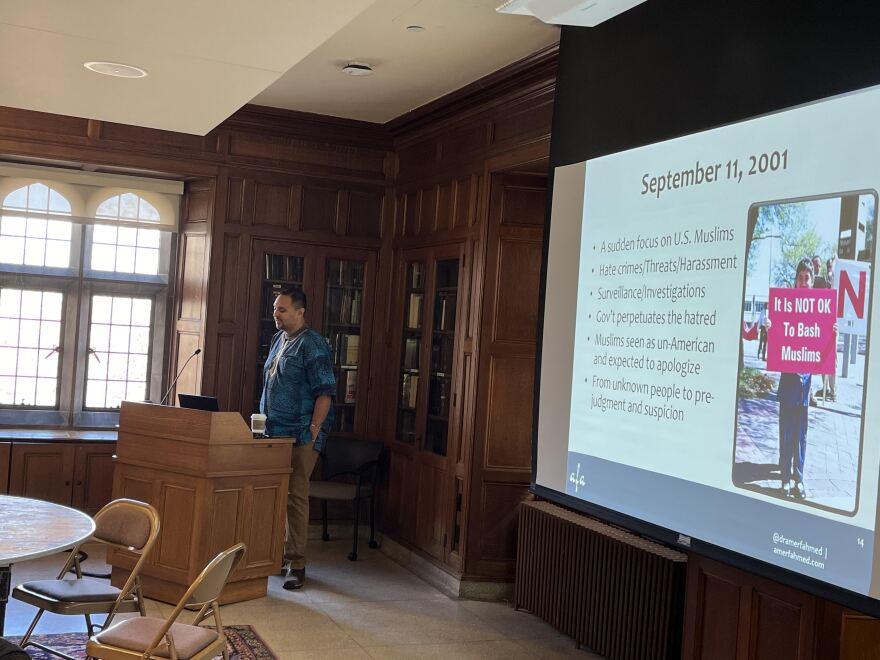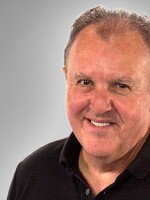- Lehigh University was host for an authority on diversity, equality and inclusion and global education at the start of International Education Week on Monday
- Amer F. Ahmed said the key to better understanding is to bring approaches to one another rather than live in individual silos
- Lehigh has a week's worth of programs scheduled
BETHLEHEM, Pa. — For the world to adequately address issues of diversity, equity, inclusion and race, a foundational approach is to stop operating in silos.
So implored one of the foremost authorities on DEI and global education during an International Education Week event at Lehigh University on Monday.
“We can’t operate in silos."Amer F. Ahmed on a strategy to unify the world's people
“What we have to do as international educators to advance DEI is bring approaches to one another," said Amer F. Ahmed, vice provost for DEI at the University of Vermont.
“We can’t operate in silos,” Ahmed said. “The silos are very unhelpful in helping students confront challenges in our world.”
International Education Week, or IEW, is an annual initiative sponsored by the U.S. State Department and the U.S. Education Department, celebrating the benefits of international education and exchange worldwide.
Ahmed is an organizational strategist who helps institutions and leaders address diversity and inclusion, equity, race and intercultural development through consulting, coaching, group facilitation and keynote speeches.
A frequently requested speaker nationwide, Ahmed uses an approach grounded in a commitment to inclusive community and excellence.
He brings his identity as the son of Indian Muslim immigrants and extensive years as an intercultural and diversity consultant as the sources of a pivotal understanding of the depth of equity and inclusion work.

'All forms of marginality'
Ahmed explained to the gathering in Lehigh's Linderman Library that he draws on lived experience, deep theoretical analysis and practical application to guide institutions, leadership and workplaces on a path to transformative change.
“Throughout my career, I have consistently addressed all forms of marginality that impact how individuals experience institutions and issues of social justice that continue to face traditionally marginalized communities,” he said.
“In high school, I felt that being Indian, being Muslim made me weird. I thought, ‘Why can’t we be more like white people? Why are we late to things?’ I didn’t realize then I was being interlaced with things people around me were saying."Dr. Amer F. Ahmed, vice provost for DEI at the University of Vermont
Ahmed’s hour-long discussion was titled Dismantling the U.S. vs. International Dichotomy: Creating Synergy Between Diversity and Global Education.
Born and raised in Springfield, Ohio, Ahmed counts noted singer/songwriter John Legend as a high school classmate.
But Ahmed said it was his experience feeling like a social outcast because of his race and religion that made its mark on him growing up in a racially and economically stratified community.
“In high school, I felt that being Indian, being Muslim made me weird,” Ahmed said. “I thought, ‘Why can’t we be more like white people? Why are we late to things?’
"I didn’t realize then I was being interlaced with things people around me were saying.
"When I was in South Africa, most people on my campus were white. It was evident the whites' interpretation were different from mine. I was being expected to act like I was Indian."
'Not attached to the world'
On many U.S. campuses, DEI initiatives often are separate from global learning efforts — driven by unique missions and goals, centered around distinct courses and programming and overseen by separate staff.
It's rare to find collaboration between the two entities, experts say.
DEI principles are typically domestically focused and usually revolve around social constructs such as racism, sexism, personal backgrounds and biases and other individual factors.
“I said that power inequity is everywhere. When we pretend these historical inequities like racism are specific to the U.S. only, it basically ignores all of colonialism."Dr. Amer F. Ahmed, vice provost for DEI at the University of Vermont
They center on how individuals relate to and understand one another, as well as the world around them. While global learning also encompasses those perspectives, it approaches them through a framework of intercultural communication, language and culture from the perspective of a nation’s norms.
Ahmed has studied at American colleges and universities as well as in South Africa and Nepal. He said that what he repeatedly heard from international educators was that racism is a U.S. thing.
“I said that power inequity is everywhere,” he said. “When we pretend these historical inequities like racism are specific to the U.S. only, it basically ignores all of colonialism.
“In those places outside the U.S., people don’t call it race or racism. So, what I’m saying is, I’m not attached to the word. I’m attached to the phenomenon of the stratification that exists around the world and throughout the colonized world — lighter being better and darker being worse; lighter being prettier and darker being uglier.
“Privileged groups benefit, marginalized ones don’t.”
Routinely profiled
Ahmed spoke of a post-9/11 world in which people of color routinely are racially profiled.
"I got pulled off a plane two weeks ago — again," he said. "And every male member of my family has been on a watch list at one time or another."
Two other events at Lehigh later Monday included students from the Global Union marching about campus carrying the flag of their home country or a country in which they have had a global experience.
A kickoff celebration also was held at the STEPS Concourse featuring cultural foods, performances by campus dance teams, education on many university cultural groups and opportunities to learn about international campus resources.
A full schedule of IEW events at Lehigh this week can be accessed at global.lehigh.edu/IEW .
'It's just that they don't understand'
Lehigh makes available to students high quality international academic opportunities, with more than 250 study programs abroad in more than 60 countries.
The program offers shorter programs led by Lehigh faculty or staff, to semester or year-long programs offered by university partner institutions.
“International education is driving the future, and it’s truly part of our DNA at Lehigh University. At Global Lehigh, we seek to position our graduates to engage the world and to thrive professionally and personally in today’s global arena.”Cheryl Matherly, vice president and vice provost for international affairs at Lehigh’s Office of International Affairs
“International education is driving the future, and it’s truly part of our DNA at Lehigh University,” said Cheryl Matherly, vice president and vice provost for international affairs at Lehigh’s Office of International Affairs.
“At Global Lehigh, we seek to position our graduates to engage the world and to thrive professionally and personally in today’s global arena.”
Angelina Rodríguez, assistant vice provost for Global Learning at Lehigh University was particularly appreciative of Ahmed's emphasis on inviting people to continue thinking about collaborations between global education and DEI perspectives.
"Understanding more about work in both arenas will enrich and improve work in both arenas as well," Rodriguez said. "Certainly, thinking about how we engage difference demands considerations of power, history, inequities, colonialism and intersectional identities, something that deeply informs our OIA mission to prepare our students to engage the world and address global challenges.”
As for Ahmed, he said his wish is for people to uphold their own values in their understanding of humanity.
“Just because people hold different perspectives from you doesn’t mean they hate you,” he said. “It’s just that they don’t understand.
“We have resources in higher education to drive that process of change.”


